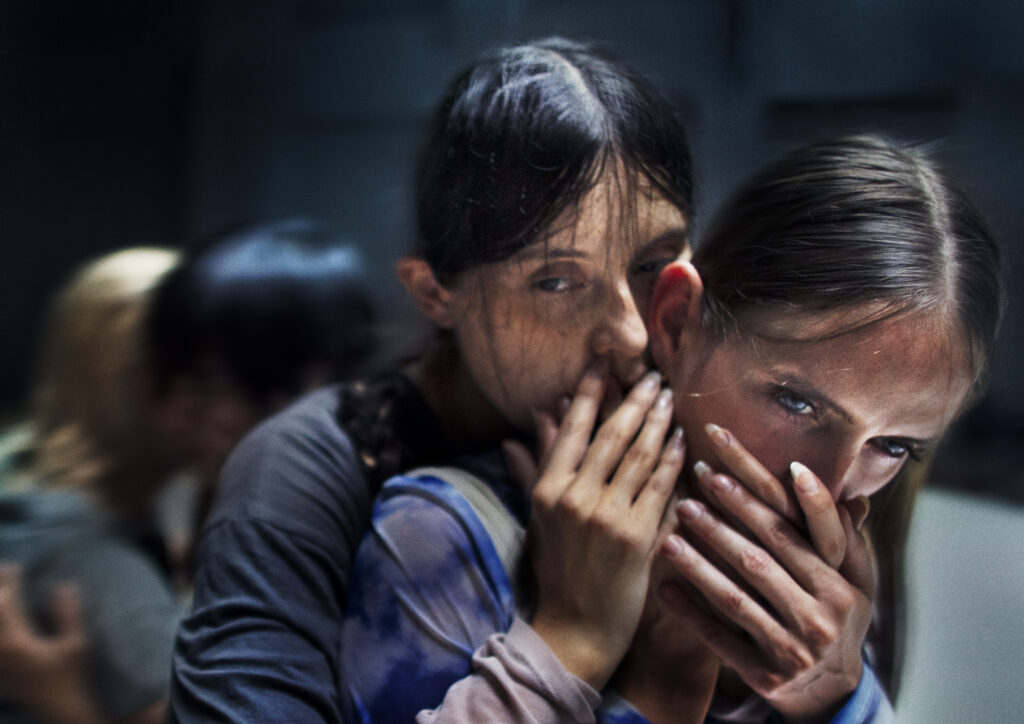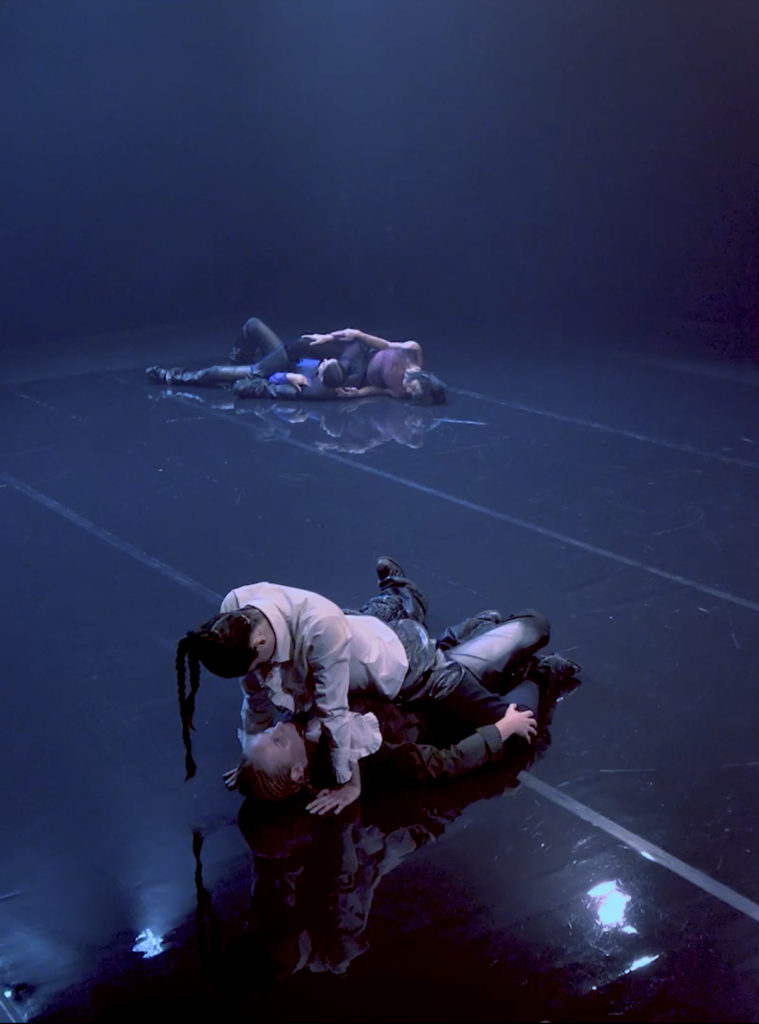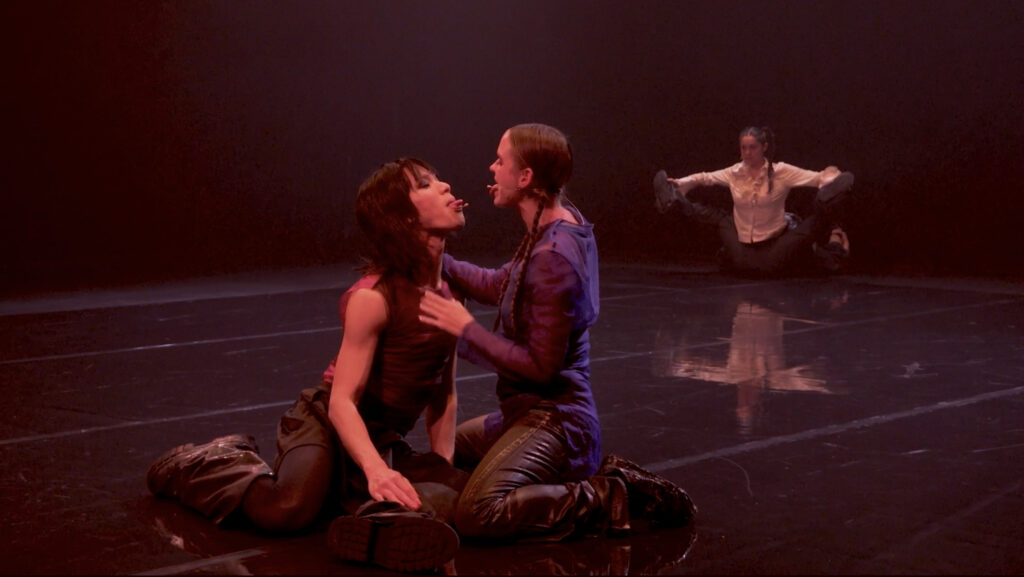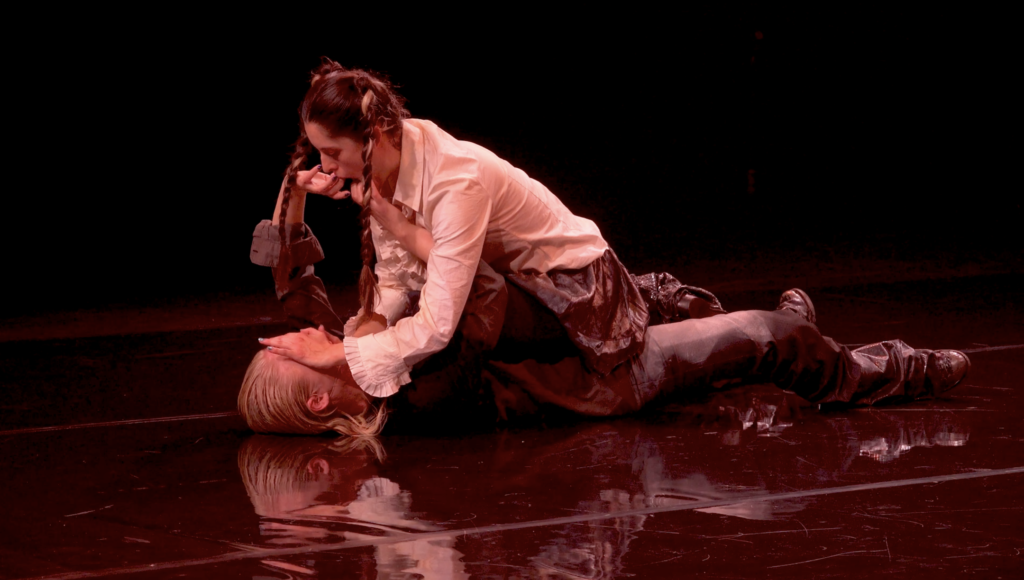Conversation with Emilie Gregersen
March 2025, Ingeborg Zackariassen

Emilie Gregersen (they/them, she/her) (b. 1993, DK) is an artist, choreographer and dancer based in Copenhagen.
Gregersen is co-founder of Dance Cooperative; an artist run platform and studio for dance and choreography, currently organised by 12 performance artists in Copenhagen. She holds a degree in dance and choreography from The Danish School of Performing Arts and has since 2018 produced her own works which has toured throughout Europe. Gregersen has been granted The Danish Arts Foundation working grant (2024) and Edit Allers Memorial Grant (2021) for her performances ”touch” and “Caresses”.
The final part of the trilogy, On My Tongue, had its world premiere at Dansehallerne, Copenhagen in 2024. In March 2025 the work is shown at 3:e Våningen, Göteborg as well as Uferstudios, Berlin.

When I manage to catch an online conversation with Emilie Gregersen, she has recently returned to Copenhagen after a choreographic residency in São Paulo. She excuses herself for being confused and jetlagged, and even though I empathize with her sensation, I find her presence to be extraordinarily calm and focused.
It’s been 3 years since the last time Gregersen presented a work in Gothenburg (in 2022 she presented Caresses, the second part of the Touch-trilogy at 3:e Våningen) and I’m curious to hear her thoughts about the last few years and the completion of her trilogy on Touch.
Can you tell me about this trilogy you’ve been developing for the last five years ? How did Touch come about?
–The core concept for the trilogy is working with touch through a queer- and phenomenological perspective. The first work, which is called touch, is a solo, which was created just before the pandemic. I was interested in working with touch through the tension between intimacy and distance, and portraying that through this figure or version of a cyborg set in like a very text-sensual sci-fi universe.
The second piece, Caresses, is a duet performed together with Paolo, who is actually also performing in On My Tongue. In that piece, we were specifically working with caresses as an omnipresence; a lens of understanding sensory modalities, specifically the haptic and the optic- the touch and the gaze- taking the audience on a trip with us through this sensuous aesthetic and poetic universe.
– And now we’re here with On My Tongue [The cast consists of Paolo de Venecia Gile, Sigrid Stigsdatter Mathiassen, Luisa Fernanda Alfonso, as well as Emilie Gregersen herself]. The piece started with an interest in working with consent through moving, and specifically also questioning the history of dance through moving together and finding ways to make this a place to talk more about consent in relation to touch and movement, specifically when improvising together in contact improvisation. That was my core entrance into the work, and then it really became a piece about communication and trust.
In the piece, you’re following these four characters as they navigate friendship, queer romance, but also the complexities of intimacy and consent, and what it means to be in connection with each other. I feel like it really became a piece that [acts like] a force field of touch and of desire and of moving together.
In touch, you worked with the notion of a cyborg body. Is the non-human a theme which has stayed throughout the trilogy?
I read you as this piece being very connected to sensuous experience, and I wonder, are you still exploring questions of the human versus something else?
–Well, for the solo, touch, the first piece, it was specifically the relationship between the human and the non-human, which I was interested in. In this piece, On My Tongue, I definitely work with characters, and I’m not so focused on the human, non-human situation. I’m more interested in taking familiar situations of human relations and queering them, or distorting them, twisting them into something else. From the human and non-human kind of conversation in the solo, now it’s more about four humans relating to each other and the touch and gaze in that universe.
What about the duo Caresses? Does it act as a bridge between the two?
Do you see any (chrono)logical development of your exploration of touch, or how do they speak to you in retrospect when imagining the three pieces next to each other?
– I think they have similarities in performativity. Everything is very heightened and there is a similarity in the way they relate to music.
All of the pieces are created very much in connection with music, with Karis Zidore, who has composed music for all three pieces, and that is quite essential for all of the works. But if I think of it like a journey through all the pieces, I would say that the solo touch is very much about a phenomenological understanding of touch through this very specific android figure, and Caresses for me is way more about an essential trip – and trip in multiple understandings… On My Tongue is more about friendship, queer romance and relationships, going more into the psychological understanding of touch, where physical and emotional boundaries somehow blur.
Your close collaboration with the composer Karis Zidore, did it start with the trilogy?
– Yes, we worked for the first time together on the solo.
[If you have seen the work On My Tongue, you will have experienced this interconnectedness between music and movement, how they blur into each other, creating unexpected material, which in its turn creates the fluid and constantly morphing expression so emblematic for the work]
I’m curious about reason how this became a trilogy rather than three separate pieces? And did you envision it as a trilogy already when you started creating the first piece?
– I started creating the first piece without knowing it would become a series of works. But then I invited Karis, and also dramaturg Naya Moll to work with me, and I feel that together we really formed a foundation for the trilogy. It was while creating touch that I understood there’s more to this; that there’s much more that I want to dive into. I wanted to be very specific in the first solo, and even though I had a lot of ideas, I wanted to decide “this is what we go for.” The other things are for another piece. Then I realised that since [the ideas] are so related, I might as well create a trilogy…
It’s a great way of solving the “problem” of having many good ideas that are interconnected.
– Yes, but I also saw it a bit as a challenge for myself. I knew I wanted to create Caresses and I had an idea about the piece, but I had no clue what the third piece would be. But I knew that if I call it a trilogy, I would have to insist on this. And I liked the idea of insisting on something instead of jumping from project to project. So for me, it was also a way of going deeper with something.
It seems like the work has been multiplying itself. Was it a conscious choice to “grow” from solo to duo to quartet?
– Yeah. It grew bigger and bigger also because touch was my first work I ever did as a solo choreographer, that was signed just by me. So I feel like the trilogy has also grown along with my artistic development.


Emilie graduated from The Danish School of Performing Arts in Copenhagen in 2017 and describes her close artistic journey with Lydia Östberg Diakité, together with whom she studied together and later founded Dance Cooperative in Copenhagen, a studio and a platform which now includes 12 performing artists.
–The development [of the Dance Cooperative] has been a very important step in my journey.
Have you been choreographing constantly since you graduated from the Danish School of Performing Arts?
– Kind of. Half of the time I work as a dancer, and often perform in other choreographers’ pieces.
Apart from the Touch-trilogy, Emilie has also created other pieces , and at the moment she’s working on a solo called Trixster, which will premiere next year, but which she started working on before On My Tongue.
– There are some weird overlaps happening all the time, she says, with a smile.
Can you elaborate a bit more on what the verb queering? And when you say queering the idea of touch or consent or romance, what does that mean in your work?
–First of all, I’m interested in showing things on stage that I myself have a need to see, and queer representation is an important matter to me. Besides gender identity and sexuality, the original meaning of the word “queer” is related to something being strange, peculiar, odd, twisted – which are terms I actively choreograph from – almost as a way of reclaiming words that were once used against queers.
And then I have this thing about just constantly being very perplexed by the banalities of human relations and how beautiful and touching they can be, but also how ugly and nasty they can be. So I’m interested in taking these situations that I know from my everyday life that inspire me and then cutting them apart, putting them back together in a different way, to like see if I can create something new with it or the opposite, to take something really weird or strange and making it the norm in the piece. That’s also something I really like to do.
And I feel like there’s also something that I work a lot with specifically for this piece… When you asked me how I queer things, or how I twist things, I think I often do it through the means of something very uncanny, or something very erotic, or funny. I feel like these elements are “hotspots” in my way of choreographing this piece.
So if I understand you correctly, the choreographic act of queering is for you a sense of taking things apart and putting them together in new ways; a sense of twisting and reorganising?
–Yeah, exactly, it’s a lot about that, but it’s perhaps even more about amplification. Instead of a twisting of an image you can also amplify it so much that it gets this heightened expression that is really exaggerated.
[When later the same week I get to experience the work On My Tongue, I come in contact with this amplification; embracing the uncanny, erotic, weird things that unfold on the stage; thinking that the world needs more queering.
Erin Manning’s 2007 bookThe Politics of Touch comes to mind, in which she cites philosopher Brian Massumi:
– …Expressions are not simply representations, descriptions, content-driven empirical correspondences. Expressions cannot be reduced to external forces reacting upon a body. Expressions are in and of the body, sensual and sensing: The force of expression . . . strikes the body first, directly and unmediately. It passes transformatively through the flesh before being instantiated in subject-positions subsumed by a system of power. Its immediate effect is a differing.
The body, fresh in the throes of expression, incarnates not an already-formed system but a modification—a change.
Certain performances simply have to be experienced.]
If you find yourself in Berlin 27–29 of March, make sure you include a trip to Uferstudios https://www.uferstudios.com/en/dance/events
Here you will have a chance to experience On My Tongue. And watch out for her new solo performance, Trixster, coming up in 2026.
More info about Emilie Gregersen and her choreographic work on her website: https://emiliegregersen.com/